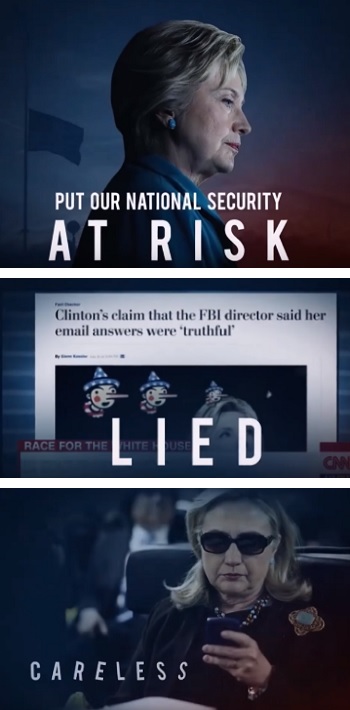The Nasty Realities Of The Political Attack Ad Industry

If shady political attack ads have a Mona Lisa, it's probably the one that slammed presidential candidate Michael Dukakis for issuing "weekend passes" to a convicted murderer named William Horton. Horton went on to commit assault, armed robbery, rape, and career assassination (on Mr. Dukakis). No attack ad this election season has come close to that amount of damage. Cracked wanted to know why, and what makes a good attack ad in the first place, so we sat down with a man who makes them. Rick Wilson is a Republican strategist who has helped to craft hundreds of attack ads. He explained ...
You Attack Strengths, Not Weaknesses

One of Rick's most infamous ads was produced during the 2008 election, highlighting the fact that Barack Obama's former pastor, Reverend Jeremiah Wright, said "God Damn America."

While Barack Obama's gigantic, disembodied head stared down in shame.
Obviously, it didn't win the election for McCain. Rick explained that the most successful attack ads don't go after a candidate's weaknesses: They take aim at strengths. One of Rick's most successful ads was an attack against Democratic Senator Max Cleland during his 2002 campaign against Saxby Chambliss:
That's the face of Cleland -- a veteran and a strong candidate on homeland security -- buddying up right next to Osama bin Laden. The ad accused him of undermining the War on Terror by voting against several Homeland Security bills.

This was back when you could demonize kittens by putting their picture next to bin Laden's.
"The Cleland ad was powerful because it went to his strengths," Wilson explains. "Everyone assumed Cleland was immune to critiques on national security issues ... we found a lot of votes where he'd voted the wrong way ... we tested those messages and discovered those messages were very effective against Cleland ..." There was an outcry against the ad by some Republican veterans, like John McCain, and it was eventually pulled. But Cleland, who'd started the campaign 22 points ahead, lost to Chambliss. No one on his campaign ever figured out how to counter the ad. Considering Cleland had lost an arm and both his legs to a grenade in Vietnam ...

... they assumed no one would dare to hit him on defense. Rick Wilson dared: "... they didn't calculate that I have no moral center when it comes to political ads, and I will destroy the innocent and the guilty ..." Yes, he does sound like the Punisher of Commercial Land. But ...
Even In Attack Ads, There Are Rules

The attack ad industry isn't the lawless wasteland it may seem. For example, unlike the newspapers, a good attack ad should avoid finding the worst possible picture of a candidate:

This isn't out of any sense of fair play, though -- it's a tactical decision. Rick explained: "If you're doing a negative ad, you don't want to pick the most goofy picture, because then you undercut the seriousness of the ad ... if it's a female opponent, you don't want to use the most ugly picture ... , I'd rather use a picture of her looking formidable and scary." Rick said this is part of human psychology. "There are unspoken boundaries people have," and one way to make them leap to someone's defense is the perception that "you're piling on." In other words, "I can make an ad that says 'Hillary Clinton has had 40 people assassinated,'" but accompanying that with an unflattering selfie would cross the line.

"Crooked Hillary" magically gains sympathy points if you merge her with "Pork Chop On A Stick-Lovin' Hillary."
Most attack ads are produced by PACs, which keeps official campaigns from getting their hands dirty. But that means the people making attack ads can't coordinate with the campaigns they're supporting. And yet according to Rick, that's not a huge deal: "... this is a tribe with only a few hundred members on each side. So if I'm on the super PAC side, I'm going to know who the guys are on the other side ... we're all going to have similar polling numbers and make similar judgments ... while we can't communicate directly, everyone understands the rules of the road and how to read the metrics."
And he did note that the business has changed a lot over the decades: "'X likes to rape little puppies because she's a bad Democrat' -- that doesn't work anymore ... the overly dramatic, unsourced assertion does not work anymore in the way that it used to. What does work is the other person's words used against them ..."
Annnnd sometimes a group will ignore all that and do this.
Oh, boo. Now we have to be accountable for the things we say? Bad form, old boy. Bad form.
Attack Ads Look Cheap And Terrible For A Reason

According to Rick, you don't want your attack ad to look too clean or professional. Take the wildly successful Max Cleland spot ...

We didn't mess up the resolution. In fact, no one did.
"... we made it deliberately look junky, the ad looks awful ... I told my producer I wanted this ad to look like it came from a guy working at a local TV studio doing a State House race ... we wanted it to look very rough and unpolished ... the reason we were brought into this campaign is all the D.C. media consultants had been producing slick D.C.-style ads, and they weren't working."
That Reverend Wright ad from earlier definitely didn't turn the tables on Obama, and it's noticeably slick ...

They even put together a fake, well-lit living room for Obama.
Now compare that one to this recent anti-Trump attack ad. It's very slick, well-edited, and "piles on" the Republican candidate with both substantive critiques and video of him looking ridiculous.

Which, to be honest, is most video of him.
Meanwhile, here's the worst picture of Max Cleland you'll find in the ad that helped bury his career:

It's bad when even your glamour shot screams "LIAR."
By every aesthetic measure, the attack ads released against Trump are vastly superior to the Cleland and Willie Horton spots. But not one of them has left a mark on Trump. Part of the problem is that they're too easy. The quality of the editing belies the laziness of the concept; you're not going to find anything new in an anti-Trump ad.

This one's apparently hoping to swing the crucial "hiding under a rock for the last 12 months" demographic.
Doing The Legwork Is What Makes A Good Attack Ad Sting

One of Rick's most successful ads came during Rudy Giuliani's run for mayor of New York City, "... a city that was 5-1 Democratic to Republican ... we were running against a female candidate , and she was raising money and she was organizing and she was effective and he was not beloved then ... we were in the middle of waging this war on sex shops and strip clubs in Times Square ..."
So Rick and his team spent hours combing through everything Ruth Messinger had ever said. They found this quote claiming sex shops were ...

Which is bullshit -- they're only important for the owners' economic base.
This quote was one of a few potential avenues of attack Rick and his co-workers focus-grouped on several likely voters: "... we tested a whole bunch of stuff ... she's too liberal, she loves criminals ... two things tested like gangbusters: educational reform and that sex shop thing, and that went to her strength, which was women."
The key to it was presenting that quote to a number of real women and allowing them to express their outrage and disgust. One of the women was a ringer, a Giuliani volunteer picked to add extra "oomph." The ringer is the lady who says "sex shops degrade women."
But only one testimony was a plant. Rick said "... we probably did 100 interviews to get the six or seven that are in there ... those are real people, there's only one ringer in the whole ad -- a person who was a volunteer for the campaign, and she was really good. And that just destroyed . Just took the wind right out of her."

Proof that you never have to wait long to find a bunch of New Yorkers pissed off about something.
And it wouldn't have had that impact without the real responses: "... have I used actors in ads? Sure I have ... but in an ad like that ... we just went out and did the legwork on it."
Legwork is vital. You'd be a fool to run an attack ad without testing to see whether it might make you more enemies than friends. "We tested Reverend Wright ad in Ohio ... and we tested Reverend Wright in Charlotte, North Carolina ... both swing states. We tested specifically with undecided and soft Republicans, because that had become a problem for McCain."

Example: You'd never want to run this ad in parts where people would say, "Whoa, cool."
The testing started with a rough cut of the ad: "... probably 80 percent done ... you take it in the room and play it a few times and talk it through ." In recent years, the strategy has changed a bit: "... now we can do it online, so now they'll basically Google Hangout into it."
Prepare for the future, when attack ads are all augmented by hilarious Snapchat filters.
They Don't Make Attack Ads Like They Used To

Rick is seriously disappointed with the attack ads so far in this election. He noted that Hillary's supporters "... produced some really good negative ads -- they just haven't moved the numbers. They're good ads on paper ... the only thing they're doing is they're holding her base to her ..."
He wasn't any more positive about Trump's anti-Hillary ads:

If the best part of your ad is a funny Pinocchio head, you better be selling a Pinocchio movie.
"Trump doesn't make ads. He makes YouTube videos ... Everything they're doing right now, both of them, is very base-centric ... because 32 percent of the electorate loves Hillary ... 32 percent loves Trump ... and the remainder of the electorate would like to see them both die in a fire ..."
Rick's theory is not (yet) endorsed by any Gallup poll. But it makes sense. So how would Rick hit Trump? "I'd hit him on his mental instability, because he thinks he's smart and sane and he's not. He thinks he's a remarkable communicator ... he's not, he's a 70-year-old asshole from Queens." Then Rick would go after his "reputation for wealth, which is unfounded in large measure, and that's a soft spot for him ..."

He wants us to think he eats McDonald's because he wants to, when in truth he almost certainly has to.
A billionaire client of Rick's once said: "I'm a billionaire. Trump is a clown living on credit." So having real billionaires like Mark Cuban attack Trump in an ad would be an effective tactic.
It's probably worth noting that this interview took place a week before the first debate, where Hillary Clinton hit Trump hard on his reputed fortune. She also invited billionaire Trump critic Mark Cuban as one of her guests for the event.

Trump tends to get the shakes around people who actually could pay for the wall.
Sure, the Punisher is merciless and unforgiving. And you might not like or approve of what he does, but you have to admit: He's pretty good at it.
Robert Evans wrote a book about how all of our worst habits helped build civilization. You can buy A Brief History of Vice now!
For more insider perspectives, check out 6 Things Movies Don't Show You About Life On A Submarine and 5 Reasons Flying A Fighter Jet Is Way Crazier Than 'Top Gun.'
Subscribe to our YouTube channel, and check out 6 Political Ads So Crazy They Won Our Vote, and other videos you won't see on the site!
Follow us on Facebook, and we'll follow you everywhere.